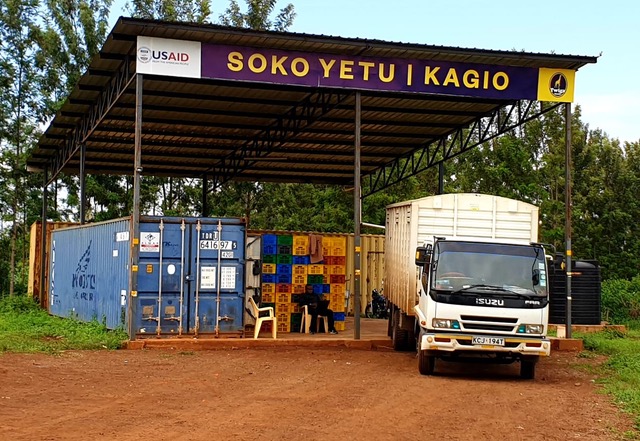Finding the sweet spot in the combination of public and commercial capital
Can you introduce yourself and explain a bit about what you do?
I am Veerle Berbers and I am on the Board of AlphaMundi Group's SocialAlpha-Bastion Fund. AlphaMundi is an investment advisory firm dedicated to impact investing with a dual mission to reduce poverty and preserve the environment in developing countries. AlphaMundi invests catalytic financing in market-based solutions to the world’s most pressing challenges.
The Bastion Fund finances the national or cross-border scale up of viable and innovative social businesses in developing countries by providing debt capital, sometimes coupled with technical assistance from AlphaMundi Foundation. While there is increasing purchasing power at the base of the pyramid, there is a shortage of local financial services for early-stage small and medium enterprises (SMEs) that seek to serve these consumers. We identify emerging and established market leaders across sectors in East Africa and Latin America with annual sales of USD 500K to USD 10M, and build up fund exposure progressively as they achieve financial and impact milestones.
We focus on SMEs that have a need for debt, with ticket sizes ranging from two hundred thousand to two million dollars. Portfolio companies are typically at an inflection point where AlphaMundi’s support on information/reporting systems, operational and financial risk management, and value chain consistency can deliver substantial added value to them and the fund, helping de-risk the companies for commercial capital.
And are you limited to certain sectors?
While we are a sector agnostic investor, we have certain sectors that we have done a lot of investments in historically, including renewable energy, microfinance, agriculture and fast-moving consumer goods. But with time, these sectors have evolved. For example, we are providing a loan to a company that works with prison inmates to help them produce handmade purses and bags for employment with the goal of reducing recidivism rates. We have another company that is new to our portfolio, which has a model for professionalising the house cleaning sector by bringing cleaning ladies out of the informal sector by providing an annual salary, benefits and more security.

When you are investing in businesses, what are the criteria or what are the things that you are looking for?
We look for companies that already have a track record with two or three years of experience, an established product or service that is generating revenue and cash flow in at least one market, and a management team that is aligned with us. Our team is looking at gender-equality both at the portfolio companies and at the beneficiary levels. We also look at their capacity to repay. We are a commercial investor and not a charity, so we need to have either collateral or look at enterprise cash flows so that we can be sure that we can be relatively secure, for our investors, that we can be repaid. We don't really take gambles on this.
For inclusive businesses, one of the four main barriers to prevent them from reaching scale is access to finance. But many investors also say there are no investible businesses. What, in your opinion, causes this mismatch?
I think one reason is that there isn't a centralised information-sharing platform. There have been many efforts to establish something like this over the past couple of years, but I haven’t seen anything successfully achieve scale.
In addition, when you're a first-time entrepreneur, there can be a lack of experience, and there is a certain education that needs to be done. A lot of incubators are playing a good role in this to help entrepreneurs make sure that their business models are right, that they're presenting them right, and that they're communicating them right. There's a lot of work that needs to be done before an enterprise can be presented to an investor, because, unfortunately, the investors generally have very little time, and entrepreneurs need to make the most of their chances.
Does this also mean that incubators are the natural partners of investors?
It's not really the segment I am in, because incubators are generally for start-ups and earlier stage enterprises than we typically invest in. But in this beginning phase, the incubators are very, very worthwhile, as are the prizes for funding that enterprises can apply to. The African Enterprise Challenge Fund, for example, was significant in supporting an enterprise in our portfolio, SolarNow. Because of this African Enterprise Challenge Fund award, as well as some early grants from the Dutch Ministry of Foreign Affairs, the entrepreneurs were able to start their company—prove the business model—and get it to a point where they could go to financiers to apply for both loans and equity. SolarNow’s first institutional loan was given by Alphamundi. They also got some equity investors, which then brought in much more corporate and institutional capital.

And would you say that this is a typical funding cycle—where you have public or institutional capital to ignite a business, and then commercial capital to take it over?
Yes, very much so, and this contributed to our thinking in establishing the AlphaMundi Foundation a couple of years ago. We understood the importance of providing more than just capital to early stage social ventures, so we established the Foundation to fulfil the Group’s need to formalise early stage technical assistance for its portfolio and priority pipeline companies. The Foundation has a pool of resources to provide technical assistance to address critical gaps in enterprise capacity spanning areas such as financial planning and accounting, internal governance and operations. We believe that donors can play a critical role in providing different types of subsidy, ranging from technical assistance to guarantees, to help improve the capacity of SMEs and reduce risk for investors.
Are there some rules of thumb that every entrepreneur needs to know? When should she apply for grant finance, when for loans ...?
I need to think about that. My first hunch would be, if you can get grant money, yes, you should, because that helps you to kickstart your company. If you are making a new, innovative business model, you need more time to prove that it's working, and so during that time you can use grants, or repayable grants.
You have been in the impact investment space for quite a long time, and you have observed how it has evolved over the years. What are the latest trends in impact investment and in finance?
I would say that 20 years ago, microfinance was started as the first impact investing sector and now that sector has attracted huge amounts of capital. Mainstream money is going to microfinance, but we now see SMEs are taking the place of microfinance. That's one trend.
Another trend is that there are more internet-related impact businesses, which make use of more technology. For instance, we are financing a company called Twiga Foods in Kenya, which allows farmers to jump immediately to the market. They have a great distribution model, whereby they cut out all the middlemen. That service is only possible because people in Kenya have mobile phones, and because this company has an incredible logistical system.
Another trend is to include guarantees in new sectors, or in companies that have not had financing before. I think grant organizations should not only give grants, but also give guarantees so that investors find it easier to pull in their money.
Something else I have observed is that often enterprises are too big to apply for a microfinance institution (MFI) loan, but they're yet too small to apply for a banking loan. So, there is the middle that that needs to be financed.
I have also seen a major trend around gender-lens investing or incorporating gender considerations throughout the investment process. AlphaMundi is a gender-lens investor and thought leader in this space. Earlier this year, we officially rolled out a gender diagnostic assessment across our portfolio and priority pipeline companies. Moving forward, all investment memos are required to incorporate gender considerations before submission to our investment committee.
Lastly, many equity providers get the attention by promising huge returns, but there's actually more working capital needed than there is available. That’s another mismatch.
And do you have an opinion about who could fill this gap with providing more working capital?
I think that you will see in the future that local banks will hopefully learn from our experience in impact investing and MFIs and see that it’s not as risky as they think.
Thank you.
Additional Resources:
Celebrating Getting Gender Smart
Impact Finance Awards (no longer available)
